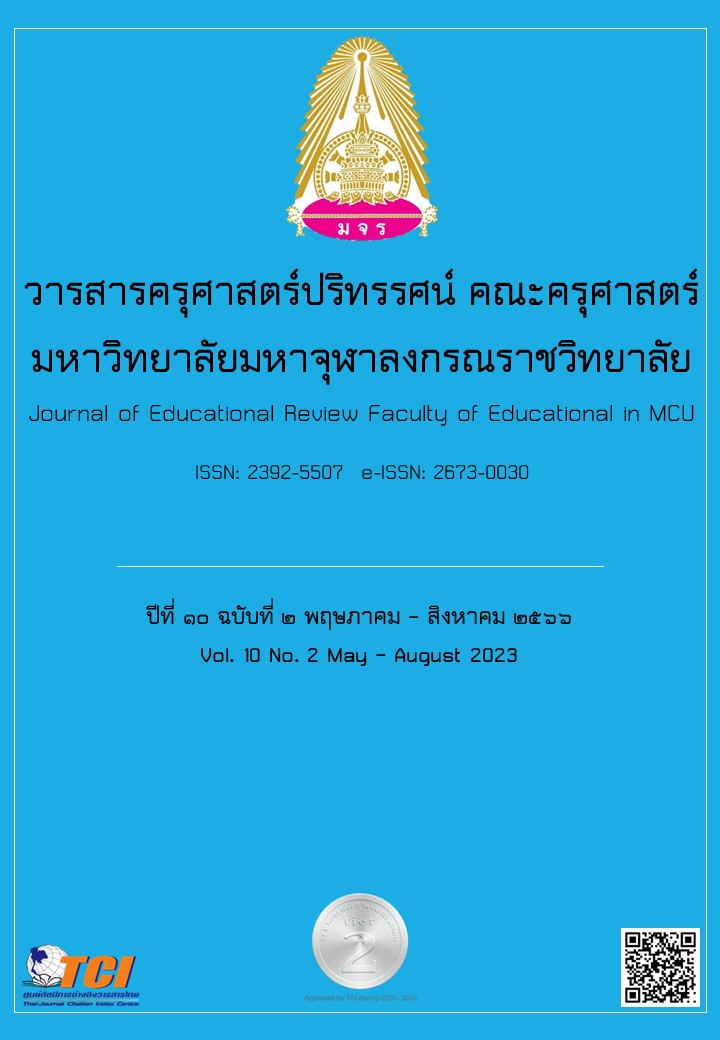THE RELATIONSHIP OF SELF-EFFICACY FOR AND USE OF METACOGNITIVE STRATEGIES IN LEARNING CHINESE AS A FOREIGN LANGUAGE WITH CHINESE ACADEMIC ACHIEVEMENT OF YEAR 5 STUDENTS AT AN INTERNATIONAL SCHOOL IN THAILAND
Main Article Content
Abstract
This study was aimed to determine whether there was a significant relationship of self-efficacy for and use of metacognitive strategies in learning Chinese as a foreign language (CFL) with Chinese academic achievement held by Year 5 students at a target international school in Thailand. A conveniently chosen sample of 70 students, enrolled in the target school during the academic year 2021-2022, participated in this study. For the data collection, Wang et al.’s (2013) Questionnaire of Chinese Self-Efficacy (QCSE), Oxford’s (1990) Strategy Inventory of Language Learning (SILL): Use of Metacognitive Strategies, and the participants’ Chinese subject’s placement test, were used. From performing descriptive statistics on the collected data, it was found that the participants’ overall level of self-efficacy for learning CFL was slightly high. The level of the use of metacognitive strategies in learning CFL held by the participants at the target school was moderately high. The overall level of the participants’ academic achievement in Chinese language class was interpreted as good. From a correlational analysis, it was found that the combination of the participants’ self-efficacy for learning CFL and use of metacognitive strategies in learning CFL had a significant and moderately strong correlation with their Chinese academic achievement, which accounted for 18% of its variance. Based on the research findings, recommendations for administrators, teachers, students, and future researchers are provided.
Article Details

This work is licensed under a Creative Commons Attribution-NonCommercial-NoDerivatives 4.0 International License.
ทัศนะและความคิดเห็นที่ปรากฏในบทความในวารสารฉบับนี้ถือเป็นความรับผิดชอบของผู้เขียนบทความนั้นเพียงผู้เดียว และไม่ถือเป็นทัศนะและความรับผิดชอบของกองบรรณาธิการ
กองบรรณาธิการขอสงวนสิทธิ์ในการคัดเลือกบทความลงตีพิมพ์และจะแจ้งให้เจ้าของบทความทราบหลังจากผู้ประเมินบทความตรวจอ่านบทความแล้ว
ต้นฉบับที่ได้รับการตีพิมพ์ในวารสารครุศาสตร์ปริทรรศน์ คณะครุศาสตร์ มหาวิทยาลัยมหาจุฬาลงกรณราชวิทยาลัย ถือเป็นกรรมสิทธิ์ของคณะครุศาสตร์ มหาวิทยาลัยมหาจุฬาลงกรณราชวิทยาลัย ห้ามนำข้อความทั้งหมดหรือบางส่วนไปพิมพ์ซ้ำ เว้นเสียแต่ว่าจะได้รับอนุญาตจากมหาวิทยาลัยฯ เป็นลายลักษณ์อักษร
References
Anyadubalu, C. C. (2010). Self-efficacy, anxiety, and performance in the English language among middle-school students in English language program in Satri Si Suriyothai School, Bangkok. International Journal of Human and Social Sciences. 5(5). 193-198.
Bandura, A. (1986). Social foundations of thought and action. Prentice-Hall.
Bandura, A. (1997). Self-efficacy theory: The exercise of control. W.H. Freeman and Company.
Chick, N. (2013). Metacognition. Vanderbilt University Center for Teaching.
Dörnyei, Z. (1998). Motivation in second and foreign language learning. Language Teaching. 31(3). 117-135.
Ellis, R. (1986). Understanding second language acquisition. Oxford University Press.
Gardner, R. C. (2010). Motivation and second language acquisition: The socio-educational model (Language as social action). Peter Lang.
Kitikanan, P., & Sasimonton, P. (2017). The relationship between English self-efficacy and English learning achievement of L2 Thai learners. Language Education and Acquisition Research Network (LEARN) Journal. 10(1). 149-164.
Klomegah, R. Y. (2007). Predictors of academic performance of university students: An application of the goal efficacy model. College Student Journal. 41(2). 407-415.
Kummin, S., & Rahman, S. (2010). The relationship between the use of meta-cognitive strategies and achievement in English. Procedia Social and Behavioral Sciences. 7(C). 145-150.
Lai, Y. C. (2009). Language learning strategy use and English proficiency of university freshmen in Taiwan. TESOL Quarterly. 43(2). 255-280.
Li, Z. (2019). The relationship of self-efficacy for and enjoyment of learning Chinese as a foreign language with Chinese academic achievement of Grades 7 and 8 students at Pramandanijianukroah School, Bangkok, Thailand. Unpublished master’s thesis. Assumption University of Thailand.
Mahyuddin, R., Elias, H., Cheong, L., Muhamad, M., Noordin, N., & Abdullah, M. (2006). The relationship between students’ self-efficacy and their achievement. Journal Pendidik dan Pendidikan. 21. 61-71.
Masuntisuk, R. (2013). Chinese language teaching in Thailand at the primary and secondary education levels. Report of Thai World Affairs Center (Thai World). Institute of Asian Studies, Chulalongkorn University.
Oxford, R. L. (1990). Language learning strategies: What every teacher should know. Heinle & Heinle Publishers.
Oxford, R.L., & Burry-Stock, J. A. (1995). Assessing the use of language learning strategies worldwide with the ESL/EFL version of the strategy inventory for language learning. System. 23(2). 153-175.
Raoofi, S., Chan, S. H., Mukundan, J., & Rashid, S. M. (2013) Metacognition and second/foreign language learning. English Language Teaching. 7(1). 26-49.
Raoofi, S., Tan, B. H., & Chan, S. H. (2012). Self-efficacy in second/foreign language learning contexts. English Language Teaching. 5. 60-73.
Tilfarlioğlu, F. T., & Ciftci, F. S. (2011). Supporting self-efficacy and learner autonomy in relation to academic success in EFL classrooms (A case study). Theory and Practice in Language Studies. 1(10). 1284-1294.
Wang, C., Kim, D. H., Bong, M., & Ahn, H. S. (2013). Examining measurement properties of an English self-efficacy scale for English language learners in Korea. International Journal of Educational Research. 59. 24-34.
Wang, J., Spencer, K., & Xing, M. (2009). Metacognitive beliefs and strategies in learning Chinese as a foreign language. System. 37(1). 46-56.
Xiao, H., & Lynch, R. (2017). The relationship between the use of indirect language learning strategies and Chinese learning achievement in reading and writing among students in Years 7 to 10 at Ascot International School in Bangkok, Thailand. Scholar: Human Sciences. 9(1). 262-271.
Yu, Y.-Y., Xu, L.-Y., & Zheng, C.-P. (2017). The design and application of the self-efficacy questionnaire for English language learners in China. DEC Tech Publications.


